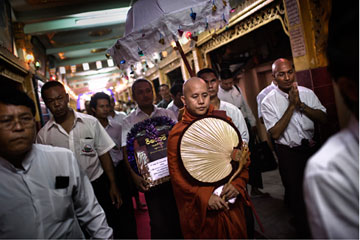
U Wirathu, the spiritual leader of the 969 Buddhist Nationalist movement, and his entourage leave after giving a sermon, at a monastery in Mandalay, Myanmar (Burma) on May 22, 2013. U Wirathu is an abbot in the New Maesoeyin Monastery where he leads about 60 monks and has influence over more than 2,500 residing there. He travels the country giving sermons to religious and laypeople encouraging Buddhists to shun Muslim business and communities.
(2 of 3)
Mantra of Hate
Sitting cross-legged on a raised platform at the New Masoeyein monastery in Mandalay, next to a wall covered by life-size portraits of himself, Wirathu expounds on his worldview. U.S. President Barack Obama has "been tainted by black Muslim blood." Arabs have hijacked the U.N., he believes, although he sees no irony in linking his name to that of an Arab terrorist. Around 90% of Muslims in Burma are "radical bad people," says Wirathu, who was jailed for seven years for his role in inciting anti-Muslim pogroms in 2003. He now leads a movement called 969 — the figure represents various attributes of the Buddha — which calls on Buddhists to fraternize only among themselves. "Taking care of our religion and race is more important than democracy," says Wirathu.
It would be easy to dismiss Wirathu as an uneducated outlier with little doctrinal basis for his bigotry, one of eight children who ended up in a monastery because his parents wanted one less mouth to feed. But Wirathu is charismatic and powerful, and his message resonates. Among the country's majority Bamar — or Burman — ethnic group, as well as across Buddhist parts of Asia, there's a vague sense that their religion is under siege, that Islam has already conquered Indonesia, Malaysia, Pakistan, Afghanistan — all these formerly Buddhist lands — and that other dominoes could fall. Even without proof, Buddhist nationalists fear that local Muslim populations are increasing faster than their own, and they worry about Middle Eastern money pouring in to build new mosques.
Since Burma began its reforms in 2011, with the junta giving way to a quasi-civilian government, surprisingly few people have called for holding the army accountable for its repressive rule. This equanimity has been ascribed to the Buddhist spirit of forgiveness. But Burma's democratization has also allowed extremist voices to proliferate and unleashed something akin to ethnic cleansing. The trouble began last year in the far west, where clashes between local Buddhists and Muslims claimed a disproportionate number of Muslim lives. Machete-wielding Buddhist hordes attacked Rohingya villages; 70 Muslims were slaughtered in a daylong massacre in one hamlet, according to Human Rights Watch. The communal violence, which the government has done little to check, has since migrated to other parts of the country. In March, dozens were killed and tens of thousands left homeless as homes and mosques were razed. Children were hacked apart and women torched. In several instances, monks were seen goading on frenzied Buddhists.
In late March, the transport hub of Meikhtila burned for days, with entire Muslim quarters razed by Buddhist mobs after a monk was killed by Muslims. (The official death toll: two Buddhists and at least 40 Muslims.) Thousands of Muslims are still crammed into refugee camps where journalists are forbidden to enter. I was able to meet the family of 15-year-old Abdul Razak Shahban, one of at least 20 students at a local madrasah who were killed. Razak's own life ended when a nail-studded plank was slammed against his skull. "My son was killed because he was Muslim, nothing else," Razak's mother Rahamabi told me, in the shadow of a burned-out mosque.
Temple and State
Dreams of repelling Islam and ensuring the dominance of Buddhism animate the Bodu Bala Sena (BBS), Sri Lanka's most powerful Buddhist organization whose name means Buddhist Strength Army. At the group's annual convention in February in a suburb of Sri Lanka's capital Colombo, more than 100 monks led the proceedings, as followers clutched Buddhist flags, clasped their right hand to their chest and pledged to defend their religion. Founded just a year ago, the BBS insists that Sri Lanka, the world's oldest continually Buddhist nation, needs to robustly reclaim its spiritual roots. It wants monks to teach history in government schools and has called for religious headscarves to be banned, even though 9% of the population is Muslim. Said BBS general secretary and monk Galaboda Aththe Gnanasara Thero at the group's annual meeting: "This is a Buddhist government. This is a Buddhist country."
